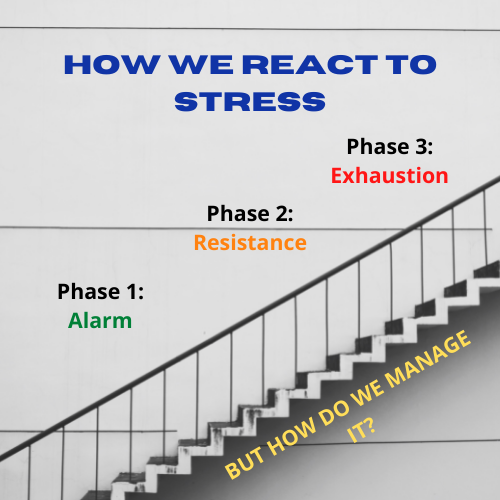
Stress is “the non-specific response of the body for any demand for change”. It is a warning system. A little bit of stress is always necessary as it keeps things moving and makes them interesting.
Stressors: Anything that causes tension or a state of strain; such as Illness, Injury, Physical, Emotional, Pressure, Environmental.
Stressors can either be Additive (1+1=2) or Synergistic (1+1=3)
We react in three phases:
Phase 1: Alarm (Fight or Flight plus physical reactions). If not dealt with correctly, then it moves to the next phase.
Phase 2: Resistance (Body resistance increases, thus weakening the body’s defense system). Constant exposure leads to the third and final stage.
Phase 3: Exhaustion (Because the body’s defense system is weakened, physical symptoms appear such as illness). When for example you live with an auto-immune illness, your body is constantly under stress.
Coaching helps clients who experience stress. When Coaching people in leadership roles or on the workplace, stress is unfortunately a very common topic.
The strategies followed are the following:
- Allow the client to familiarize with the somatic response to stress.
- Get familiar with stress — since it is a message — and be aware of the early signals.
- Help the client slow down so as not to move quickly into action.
- Understand that stress doesn’t come from a single source.
- Explore the triggers and the stressors of the client.
- How to eventually manage it and move to action.
Moving to Action: Change what you can in a targeted and gradual modification.
- Option 1: Modify your environment (eg change your job)
- Option 2: Modify your lifestyle (eg start taking care of yourself).
Main Tactics:
- Owning Time: How a person perceives time can be a factor of stress. By making it a matter of choice you can create an opportunity to take ownership, define options and re-appropriate your time (eg saying ‘no”, “trade-off”, time boxing, prioritizing, setting boundaries)
- Taking care of yourself: Prioritizing your well-being over other things (eg exercise, holiday, watching a movie, having fun, hobby, sleeping well)
- Focusing on peace of mind: Find and eliminate those little things you tolerate in life that add to your stress. Peace of mind is your highest goal so organize your life around it (eg mindfulness and meditation, non attachment)
- Build a support network: Don’t isolate yourself and leverage your network. (eg team mates, friends and family)
By owning a coping tactic you are Being at Cause (you ride the wave like a surfer) rather than Being at Effect (getting crushed by it).